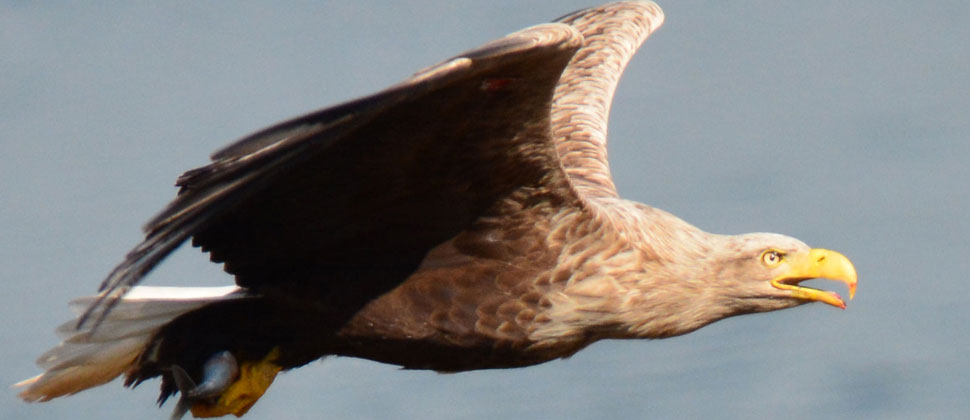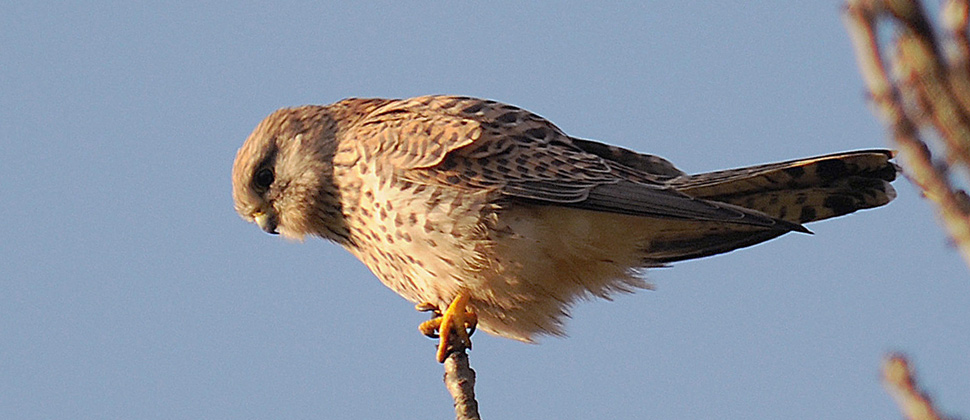News
: Dec 2012
21 December 2012
RSPB press release:
RSPB Scotland has today confirmed that an adult male hen harrier was found dead at a Perthshire wind farm, with a second bird found injured three weeks later. Hen harriers are a scarce species that hunt over rough grazings and moorland.
The birds were discovered on separate occasions earlier this Spring, in the same section of the Griffin Wind Farm, near Aberfeldy. The area had been forestry that was clear felled to aid the wind farms construction and operation.
RSPB Scotland is now able to confirm that no further hen harriers appear to have been affected at the windfarm during 2012. RSPB Scotland staff have been working closely with operators SSE to avoid any repeat tragedies. This has included visits to the site and advice to increase post-construction monitoring. This will enable staff to understand how the birds use the site, particularly during the species? display period.
The Griffin Wind farm, comprising 68 turbines, was granted permission in 2009. It was switched on in two phases, starting in March and becoming fully operational in July 2012.
The first hen harrier was discovered by engineers below a turbine on the 18th April, just three weeks later a second male was found unable to take off close to the same turbine. The bird was found to have an injured wing and sadly later died.
Aedan Smith, head of planning and development at RSPB Scotland said : This is a tragic situation and is likely to have had an impact on the local breeding success of this vulnerable species. Sustained persecution has placed the hen harrier under significant pressure, with the raptor teetering on the brink of extinction in England. However, wind farm collisions, the apparent reason for the death of these two birds, remain very rare events indeed.
It is important to remember that climate change still poses one of the biggest threats to birds and other wildlife; thus, appropriately-sited wind farms remain part of a wider range of measures to mitigate this impact. Nonetheless this new information will be used to help evaluate future windfarm proposals. Lessons must be learnt.
This case also highlights the importance of continued monitoring before, during and after a development, so we can ensure such projects can exist without detrimentally affecting our local wildlife.
In relation to the events at the Griffin wind farm at Aberfeldy, our priority now is to keep working with SSE in monitoring and researching the site, and using this information to change the management of the open ground areas so reducing future risks to these vulnerable protected species and reduce the threat of future collisions
20 December 2012
Dr Mick Marquiss, a long-term SRSG member and the current Co-Chair of the North East Raptor Study Group has been awarded the prestigious BTO Bernard Tucker Medal for services to ornithology.
The Tucker Medal is an annual award for outstanding contributions to the scientific work of the British Trust for Ornithology (BTO), the UK’s leading bird research organisation.
Mick joined the BTO in 1967, qualifying for his bird ringing permit in the same year. The medal was awarded specifically for his role, over more than 20 years, as a member of a voluntary panel of experts providing advice on special methods of marking and tracking birds.
Mick received his medal at the recent BTO annual conference in Derbyshire. Introducing him, Ken Smith said: “Mick’s mix of practical fieldcraft, common sense, wealth of ornithological experience and good science have allowed him to make a massive contribution to the work of the expert panel, and make him a worthy recipient of this prestigious award”.
Receiving the award, Mick said: “Thank you BTO for recognising me in this way. I have always thought that providing this technical advice has been vital for both ensuring the welfare of the birds but also in ensuring good quality data are collected. I have been very pleased to have been able to make such a contribution over the years”.
Mick’s unassuming nature belies a razor-sharp mind. He is perhaps best known amongst SRSG members for his pioneering research on the effect of white-tailed eagle predation on lambs in western Scotland and his long-term study on the effects of persecution on a North East goshawk population.
Congratulations, Mick!
This is the third consecutive year that an SRSG member has won the Tucker Medal. In 2010 it was won by Dr Hugh Insley (Highland Raptor Study Group) and in 2011 it went to Mike Nicoll (Tayside Raptor Study Group).
19 December 2012
From the BBC news:
Birds of prey in Scotland will be at risk of injury or death because of a decision to allow the use of so-called “clam traps”, according to campaigners.
RSPB Scotland and the Scottish SPCA are among organisations which have called on Scottish Natural Heritage to reconsider its policy.
SNH has agreed to license the use of clam traps from next year.
The trap system works by snapping shut when a bird lands on a perch to feed on bait.
They are designed to capture crows and magpies, but RSPB Scotland said “non-target” species such as buzzards and sparrowhawks would also be at risk.
It is claimed larger traps could even pose a threat to golden eagles.
Duncan Orr-Ewing, of RSPB Scotland, said: “There have been many recent incidents, including some resulting in prosecutions, illustrating the widespread misuse of the current range of traps and the deliberate targeting of protected species.
“RSPB Scotland has documented 127 confirmed incidents related to the use of ‘crow’ traps over the last 10 years, including the deliberate killing of captured birds of prey, the starvation of trapped birds, and evidence of a widespread lackadaisical attitude towards adherence to current licence conditions.
“With this in mind, we are very concerned that the licensing of new, untested traps will only increase the threats faced by our raptors.”
The Chief Superintendent of the Scottish SPCA, Mike Flynn, told BBC Scotland: “We did recommend that these clam traps should be subject to an independent, scientific trial before being licensed.
“Until such a trial has taken place, which demonstrates that these traps do not cause injury or harm to any species caught, the Scottish SPCA continues to have concerns over them.”
The legal status of clam traps had been unclear and gamekeepers have welcomed SNH’s decision to license their use on a trial basis, arguing a wide range of species including wading birds and red squirrels will benefit.
Chairman of the Scottish Gamekeepers Association Alex Hogg said: “We and other land-based agencies welcome the clarity that has been provided by SNH on the matter of identifying legal traps for use.
“Clam traps have been used for the past four years with no evidence of welfare issues.
“They are used as effective tools for the protection of game birds from predation. Black grouse and waders, whose numbers are of conservation concern, have also been shown to benefit.”
Scottish Natural Heritage has pledged to monitor the use of clam traps carefully.
Ben Ross, SNH’s licensing manager, said: “We will commission objective research on these traps; if the research shows they pose unacceptable risks, we will then prohibit them.
“We’ll also work with partners to develop a code of practice for the use of traps.”
Archive:
2015
- February,
- January,
2014
- December,
- November,
- October,
- July,
- June,
- May,
- April,
- March,
- February,
- January,
2013
- December,
- November,
- October,
- September,
- August,
- July,
- June,
- May,
- January,
2012
- December,
- November,
- October,
- September,
- August,
- July,
- June,
- May,
- April,
- March,
- February,
- January,





